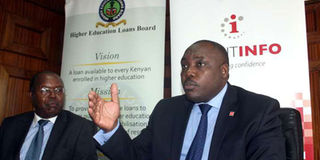Helb's new move in loan repayment chase

Higher Education Loans Board (Helb) CEO Charles Ringera speaks during a press conference on February 4, 2016. Mr Ringera has said the the board is more focused on alternative sources of money. PHOTO | ROBERT NGUGI | NATION MEDIA GROUP
What you need to know:
- This is after the National Transport and Safety Authority struck a deal with Helb that will see defaulters repay their loans first or commit themselves before getting the licence.
- Mr Ringera said the board was also sharing data with the Kenya Revenue Authority, the National Hospital Insurance Fund (NHIF), the NSSF and the Immigration department but said it should be anchored in law.
Kenyans who have defaulted on their loans from the Higher Education Loans Board (Helb) will not be allowed to renew their driving licences.
This follows a deal struck between the National Transport and Safety Authority and Helb that would require defaulters to repay their loans first or commit themselves to repaying before getting their licences.
“We recently compared driving [licence holders] and Helb defaulters and surprisingly we matched 8,000 records of driving [licence] holders who are not repaying; we have agreed with [the] NTSA that one will not renew driving [licence] this year if he or she is a defaulter,” Helb Chief Executive Officer Charles Ringera said in a statement.
Mr Ringera said the board was also sharing data with the Kenya Revenue Authority, the National Hospital Insurance Fund (NHIF), the NSSF and the Immigration department but said it should be anchored in law.
“We want our Act reformed to help address the myriad of challenges — a more progressive Act that will allow us unfettered access to credit information or tracing of loanees,” he added.
He lauded the government's support for the implementation of Chapter 6, saying it should go beyond the public sector to the private sector by heightening Helb compliance.
“We are working with all recruitment companies to have Helb compliance as part of the due diligence for potential employees,” said the chief executive officer.
He disclosed that the board had started a comprehensive diaspora engagement with borrowers by appointing “Helb brand ambassadors” and also appointing private debt collectors particularly in the US, the UK and South Africa.
“We tested this in September in [the] US and within a month of [the] diaspora engagement in churches and conferences, we collected over Sh20 million,” said Mr Ringera.
EXTRA INCOME
Mr Ringera added that the board is more focused on alternative sources of money.
“We want to rebalance our balance sheet which is not 60:40 funded by Treasury and Loan Recoveries respectively,” he added, saying that this year the board will close with Sh300 million from counties and constituencies.
“Donor funding has been good with USAID funding us up to Sh300 million for health workers training,” said Mr Ringera.
He added that the board is planning to introduce education savings products and education lotteries that are all geared towards increasing the revolving fund.
“We are focused to improve our customer experience when we are serving the student so that when their turn comes to repay the loans they will emotionally remember the service we gave them,” said Mr Ringera.
The loans board is already banking on several credit reference bureaus in its bid to address the problem of loan defaulters, which now stands at Sh11 billion from 70,000 past beneficiaries.
The whereabouts of about 25,000 beneficiaries is unknown since they received the support as early as the 1970s. Also, Sh2.5 billion is still being held by beneficiaries in the diaspora.





